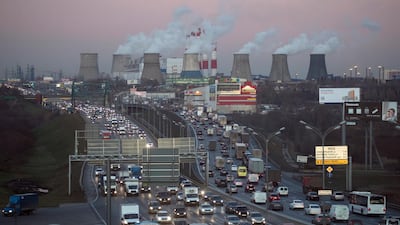Technology alone will not be able to save the planet from global warming, scientists at UN climate-change talks in Bonn have warned.
Despite an almost universal commitment to control carbon emissions, this year will see a rise of about 2 per cent after three years of levelling off, according to the Global Carbon Project.
This makes the goal of restricting global warming to less than two degrees by the end of the century, the benchmark set in the 2015 Paris Agreement, more difficult to achieve.
The increase is being attributed to China burning more coal, but some of the world's leading climate researchers say the real with problem lies with the reliance on negative emission technologies, or NETs, which are aimed at removing more carbon from the atmosphere than is released, and the failure of governments to enact real change.
“What we’ve had is 27 years of abject failure in reducing carbon emissions. Engineers like myself have a naive commitment to pet technologies,” said Kevin Anderson, the Zennström visiting professor in climate change leadership at Uppsala University. “What we haven’t tried in 27 years is mitigation.”
However, the reliance on future technological developments created a “generational passing” on of the problem and “romantic illusions” of ways to deal with climate change, he said.
If the NETs, which are largely unproven, fall flat on their promise, and governments and people continue with business as usual, then global temperatures could rise 3.5 degrees by 2050, Prof Anderson said.
Such an increase would mean more extreme natural disasters, millions displaced by rising sea levels, and food and water shortages.
Johan Rockstrom, director of the Stockholm Resilience Centre, said science can help, but the quickest and most important way to control global warming is behavioural change.
Activists groups, backed by scientific research, lobby for solutions such as reducing human consumption of meat or switching to renewable energy, but changes can be made on a much smaller scale as well.
Prof Rockstrom pointed to the climate conference itself, saying, “We have thousands of people, climate glitterati, flying to this conference … walk into a COP conference at 10pm at night and you’ll see all the screens turned on.”
He said even the two-degree warming limit was based on questionable assumptions and scientific analysis fine-tuned to align with the political and economic sensibilities.
Countries that have signed up to reduce their emissions will be asked to reassess their commitments by 2020, as current practices are putting the goal of containing climate change beyond reach, he said.
In fact, most experts agree that countries must go beyond their initial pledges to achieve the task of preventing mass species extinction, food shortages and natural disasters on a scale never seen before.
One step that can be taken overnight to fight global warming in earnest is for all 196 governments that have signed the Paris agreement to cut subsidies that give fossil fuels an unfair advantage against renewables, Prof Rockstrom said.
“We need to directly take away the $500 trillion subsidies for fossil fuels every year,” he said.
“It is what we do in the next 50 years that will determine what happen for the next 10,000 years, so this is the decisive moment, clearly,” he said.
The concept of a carbon budget — an estimate by experts of the total amount of carbon dioxide that can be emitted without jeopardising climate-change targets — is also blamed for government complacency in implementing emission-control policies.
"Don't be fooled by this, because no one can tell you the true carbon budget," said Prof Hans Joachim Schellnhuber, founding director of the Potsdam Institute for Climate Impact Research.
“By 2025 if we continue [at this rate], you will have an almost impossible task to do. Time is clearly of the essence," he said.
“Believe me every month counts, it might turn out we are too late to save the Greenland ice sheet; I am sure that we cannot save the tropical coral reefs. But we can still save 90 per cent on this earth.”

